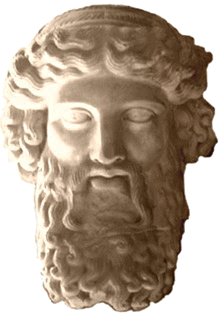...Best of Sicily presents... Best of Sicily Magazine. ... Dedicated to Sicilian art, culture, history, people, places and all things Sicilian. |
by Ignazio Lo Verde | ||
Magazine Index Best of Sicily Arts & Culture Fashion Food & Wine History & Society About Us Travel Faqs Contact Map of Sicily |
Rhetoric wasn't Gorgias' only focus. Some of his ideas foreshadowed ancient and modern existentialism and even the work of Ayn Rand. He posited that perhaps "Nothing exists." Furthermore, "in the case that anything could exist, nothing of it can be known to us." Worst of all, "even if something could be known of it, this knowledge could not be made known to others." This thesis, unorthodox or at least eccentric even for its time, may have been a cynical, ironic response to a work of Parmenides which argued the issue from the opposing side. It has been suggested that Empedocles was the mentor of Gorgias, though this is far from certain. In the event, Gorgias, who was born in 487 BC, is considered a great "pre-Socratic" philosopher and rhetorician. Aristotle counted Isocrates among his students, and later authors suggest that Pericles, Critias, Alcibiades and the Sicilian historian Thucydides studied under him too. (The bust shown here is Gorgias' detractor, Plato; few contemporary images of Gorgias are known with certainty to have survived.) Paradoxical thought and expression formed the basis of Gorgias' work, earning him the appellation "father of sophistry." Few of his works have come down to us. Best known of those which survive are part of his Technai, which includes the Encomium of Helen, the Defence of Palamedes (both probably complete), Epitaphios and On Non-Existence (only partially preserved). Making an absurd, debatable (and usually unpopular) position seem credible characterised Gorgias' expertise, but some of his ideas are more widely accepted today. His philosophy had a quasi-mystical aspect, and Gorgias theorised that "magical incantations," actually a rudimentary form of meditation, could heal certain psychological problems by improving the emotions. He never directly advocated the unequivocal concept of arete (virtue). He doubted that there was any pure excellence or arete, but that it was relative. By way of example, a servant's simple sense of virtue might not be considered virtue in a learned citizen. Gorgias' firm belief that rhetoric, if narrowly defined as the art of persuasion, was the most important of sciences (because it could be used to persuade or even manipulate others into doing almost anything), would have found favour with Hitler and Mussolini. Not surprisingly, Plato was not a great advocate of Gorgias, partly because he believed that the "rhetoric" of the latter, when used to manipulate a group, might provide an otherwise ignorant individual to seem more knowledgeable than a bona fide expert. In a vehement response to one of Socrates' criticisms, Gorgias responded, "Rhetoric is the only 'expertise' one needs to learn. One can ignore all else and still defeat the experts!" Dictators aside, the craft of today's politicians owes much to Gorgias' craft. Of course, the largely illiterate and uneducated populace of antiquity was easily influenced and controlled; nowadays, when learning and information are more readily available, most (but certainly not all) people are less easily deceived by charlatans. In his Gorgias, Plato adroitly defines the difference between philosophy and rhetoric, describing Gorgias as a masterful orator --but little else-- who merely entertains without seeing any need to learn actual scientific or philosophical truth. Hence, according to Plato, even though On Non-Existence is supposedly a philosophical work, Gorgias is not to be viewed as a true philosopher. Gorgias, on the other hand, considered philosophy to be nothing more than a means of seduction, though he does acknowledge the important social role of philosophers. Aristotle was perhaps still more critical of Gorgias, branding him an opportunist Sophist whose public performances created the illusion of cleverness and wisdom for the sake of a quick profit. Cagliostro (and most of today's dishonest Sicilian politicians and pseudo-intellectuals) owe a debt of gratitude to Gorgias --whether they know it or not. Some historians believe that Gorgias was a hundred years old at the time of his death, in Thessaly in 376 BC. The rumour of his longevity may have been his final illusion.
About the Author: Ignazio Lo Verde lectures on Greek classics and other subjects. | |
Top of Page |
 Is rhetoric philosophy? Does
being a better speaker improve the meaning of one's words? Is rhetoric reality? These were the
questions posed by the work of Gorgias of Leontinoi (now Lentini), a town
near
Is rhetoric philosophy? Does
being a better speaker improve the meaning of one's words? Is rhetoric reality? These were the
questions posed by the work of Gorgias of Leontinoi (now Lentini), a town
near